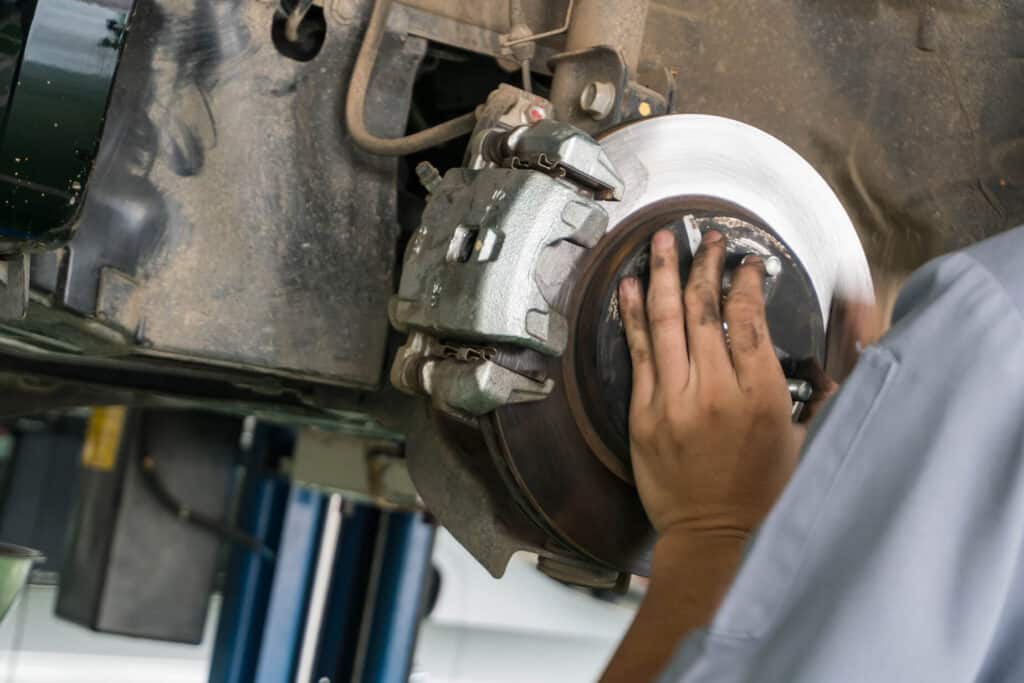Introduction: Understanding the Connection Between Brake System Health and Fuel Efficiency
Maintaining proper brake system health is not only crucial for ensuring fleet safety but also plays a significant role in fuel efficiency. This article will explore the connection between brake system health and fuel consumption, outlining the importance of proper maintenance, component selection, and driver education to maximize fleet fuel efficiency.
How Poor Brake System Health Affects Fuel Consumption
Poor brake system health, such as dragging brakes, can significantly impact a fleet’s fuel efficiency. When brakes do not release properly, they create constant friction, causing the engine to work harder and consume more fuel. Additionally, uneven brake wear may lead to increased rolling resistance, further decreasing fuel efficiency. By addressing these issues, fleet operators can optimize fuel consumption, reducing overall operating costs.

The Role of Proper Brake Maintenance in Promoting Fuel Efficiency
Regular brake system maintenance is essential for keeping fleet vehicles fuel-efficient. Routine inspections, brake pad and rotor wear monitoring, and timely brake fluid changes are crucial in ensuring brake systems function optimally. This proactive approach prevents brake-related issues that can lead to increased fuel consumption and allows for the timely replacement of worn components, preserving fuel efficiency.
Choosing the Right Brake Components for Optimal Fuel Efficiency
Selecting the appropriate brake components can also contribute to fuel efficiency. High-quality brake pads and rotors not only last longer, but they also provide better performance, leading to smoother braking and less energy waste. Moreover, lightweight brake components can reduce unsprung weight, further enhancing fuel efficiency by decreasing the overall weight of the vehicle.
Brake System Upgrades to Improve Fleet Fuel Efficiency
Investing in brake system upgrades can lead to significant improvements in fuel efficiency. Options such as high-performance brake calipers, ventilated or slotted rotors, and high-performance brake lines and fluid can contribute to more efficient braking and better overall vehicle performance. These upgrades may require an initial investment but can result in long-term fuel savings.
Implementing a Fleet Brake Maintenance Schedule to Maximize Fuel Efficiency
Developing and adhering to a customized fleet brake maintenance schedule is crucial for maximizing fuel efficiency. This schedule should include regular inspections, component replacements, and fluid changes based on each vehicle’s specific needs and usage patterns. By following this schedule, fleet managers can ensure that all brake systems remain in optimal condition, reducing fuel consumption and related costs.
Educating Fleet Drivers on Brake Usage and Fuel-Efficient Driving Practices
Driver behavior plays a significant role in fuel efficiency. Educating fleet drivers on smooth braking techniques, maintaining safe following distances, and managing vehicle weight can help minimize brake wear and reduce fuel consumption. Furthermore, promoting fuel-efficient driving practices such as gradual acceleration and coasting can also contribute to better overall fleet fuel efficiency.
Monitoring and Tracking Fleet Brake System Health and Fuel Efficiency Metrics
Utilizing fleet management software and telematics systems can assist in monitoring and tracking fleet brake system health and fuel efficiency metrics. These tools can provide valuable insights into areas for improvement, helping fleet managers optimize maintenance schedules, identify vehicles with fuel efficiency issues, and address driver behaviors that may be affecting fuel consumption.

The Cost-Saving Benefits of Maintaining Brake System Health in Your Fleet
By investing in proper brake system maintenance and monitoring, fleet operators can experience significant cost savings. Improved fuel efficiency reduces fuel expenses, while proactive brake maintenance can help avoid costly repairs and vehicle downtime. Furthermore, a well-maintained fleet enhances safety and reduces the risk of accidents, which can lead to lower insurance premiums and liability costs.
In addition to the direct cost savings, maintaining brake system health can also contribute to a more sustainable fleet operation. Reduced fuel consumption means lower greenhouse gas emissions, which is essential in today’s environmentally conscious business landscape. A well-maintained fleet demonstrates a commitment to sustainability, which can have a positive impact on a company’s reputation and customer relations.
Conclusion: Boost Your Fleet’s Fuel Efficiency Through Proper Brake System Maintenance
In conclusion, maintaining the health of your fleet’s brake systems is essential for optimizing fuel efficiency. By investing in proper maintenance, choosing the right components, and educating drivers on fuel-efficient practices, fleet managers can reduce fuel consumption, decrease operating costs, and contribute to a more sustainable operation.
Adopting a proactive approach to brake system health, leveraging monitoring and tracking tools, and continuously seeking improvement will ensure that your fleet remains fuel-efficient, safe, and cost-effective. By focusing on brake system health, fleet operators can reap the rewards of a more efficient and environmentally friendly fleet, enhancing their bottom line and bolstering their company’s reputation.
